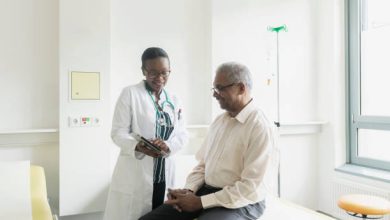You May Be Living With HIV and Not Know It…


Believe it or not, many people at this very moment are going through life, completely unaware that they may be living with Human Immunodeficiency Virus (HIV). In the Black community especially, the likelihood of undiagnosed and unrecognized HIV is significantly higher.
Given increased rates of infection, greater risk factors, and cultural stigmas surrounding the condition, this problem may only grow.
But only if we let it.
To address this issue, first, we need to be open and honest. We need to take control of our health, take steps toward action, and never allow fear or insecurity to dictate our decision-making.
Let’s go over everything you need to know about HIV, especially if you or someone you know is not yet diagnosed.
Asymptomatic Nature
Although HIV eventually presents symptoms, for many years, it can remain dormant. In other words, people may go through life, continuing the same poor habits without realizing what they’re doing. The scariest part is, that even if the virus is asymptomatic, it is still active in the body and can be transmitted.
This is why early detection is so critical. Do you engage in unprotected sex? Do you use drugs and share paraphernalia with others? Have you been intimate with someone who has? If you’re at higher risk, routine testing is highly recommended.
And remember, headaches, fatigue, and fever may all be dismissed as something else, so get tested just in case, because you can never be too careful.
Lack of Awareness
Although the awareness of HIV has improved substantially in recent decades, there are still plenty of people in the dark. According to a 2021 survey by the Centers for Disease Control and Prevention (CDC), an alarming percentage of people do not know their HIV status and do not recognize the importance of routine screening.
Fortunately, these issues can be easily resolved. If you have multiple partners or engage in risky behaviors, regular testing is a must. Usually, it can be done quickly with just a small saliva or blood sample. If you don’t want to go to a clinic, you can even test yourself at home with results in as fast as 20 minutes.
For the most reliable results, however, it’s advised that you go to a local health organization. Many of these clinics provide free or low-cost testing, so financial barriers shouldn’t be an issue.
RELATED: Living with HIV: 6 Unexpected Challenges Black Patients Face
Stigma
To this day, HIV is stigmatized. Not only does this prevent people from getting tested, but it may also promote unsafe behaviors and push misconceptions about the virus. When people feel stigmatized for being HIV-positive, they’re less likely to seek help, and more likely to isolate and continue risky habits.
Discussions about HIV should be encouraged across settings, whether in school settings, at home, or in community spaces. With continued discussion, people will feel more at ease, thereby reducing fear and creating an environment of understanding and acceptance.
People can even share their experiences, whether they’re HIV-positive with effective treatment, or ‘dodged a bullet’ but learned their lesson. Whatever the case may be, it’s important to remember one thing: HIV is not a death sentence.
Risk Misconceptions
Nobody is immune to HIV. Any person, of any color or creed, can contract the virus. It doesn’t discriminate based on age or experience. And it doesn’t care what sex or gender you are. This is important to remember because many people incorrectly assume that HIV is a ‘gay disease.’
While there are higher prevalence rates among men in same-sex relationships, that doesn’t prevent others from contracting it. Among Black populations, regardless of sexual orientation, HIV is significantly more prevalent.
The sharing of needles, unprotected sex, multiple partners, and a general lack of awareness all contribute to these disproportionate rates.
RELATED: 5 RARE Symptoms of HIV & How to Beat Them!
Healthcare Access
First off, it is true that many in the Black community face economic and medical disparities when it comes to HIV healthcare. But here’s the good news. Even if you lack insurance, can’t get transportation, or find yourself lacking the necessary information, you can still get what you need.
Many treatment facilities provide services on income-based scales, so if you’re struggling financially, you can still get help. Moreover, many community resources such as nonprofits and nearby health departments can offer testing and treatment for people who don’t have insurance.
So don’t stress yourself sick! Whether you’re worried you contracted the virus, or just want to be safe and get tested, the resources are available.
By taking everyday steps toward education and awareness, you can take charge of your health. And, if your fears are confirmed and you test positive, rest assured…
Many modern treatments can allow you to live a normal, healthy, fulfilling life!




